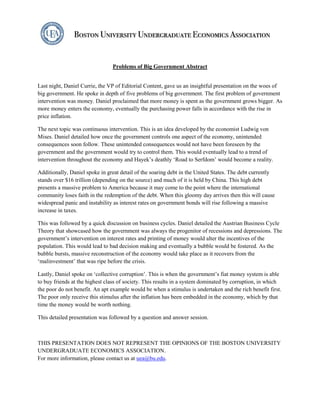Problems of-big-government-abstract
- 1. Problems of Big Government Abstract Last night, Daniel Currie, the VP of Editorial Content, gave us an insightful presentation on the woes of big government. He spoke in depth of five problems of big government. The first problem of government intervention was money. Daniel proclaimed that more money is spent as the government grows bigger. As more money enters the economy, eventually the purchasing power falls in accordance with the rise in price inflation. The next topic was continuous intervention. This is an idea developed by the economist Ludwig von Mises. Daniel detailed how once the government controls one aspect of the economy, unintended consequences soon follow. These unintended consequences would not have been foreseen by the government and the government would try to control them. This would eventually lead to a trend of intervention throughout the economy and HayekŌĆÖs deathly ŌĆśRoad to SerfdomŌĆÖ would become a reality. Additionally, Daniel spoke in great detail of the soaring debt in the United States. The debt currently stands over $16 trillion (depending on the source) and much of it is held by China. This high debt presents a massive problem to America because it may come to the point where the international community loses faith in the redemption of the debt. When this gloomy day arrives then this will cause widespread panic and instability as interest rates on government bonds will rise following a massive increase in taxes. This was followed by a quick discussion on business cycles. Daniel detailed the Austrian Business Cycle Theory that showcased how the government was always the progenitor of recessions and depressions. The governmentŌĆÖs intervention on interest rates and printing of money would alter the incentives of the population. This would lead to bad decision making and eventually a bubble would be fostered. As the bubble bursts, massive reconstruction of the economy would take place as it recovers from the ŌĆśmalinvestmentŌĆÖ that was ripe before the crisis. Lastly, Daniel spoke on ŌĆścollective corruptionŌĆÖ. This is when the governmentŌĆÖs fiat money system is able to buy friends at the highest class of society. This results in a system dominated by corruption, in which the poor do not benefit. An apt example would be when a stimulus is undertaken and the rich benefit first. The poor only receive this stimulus after the inflation has been embedded in the economy, which by that time the money would be worth nothing. This detailed presentation was followed by a question and answer session. THIS PRESENTATION DOES NOT REPRESENT THE OPINIONS OF THE BOSTON UNIVERSITY UNDERGRADUATE ECONOMICS ASSOCIATION. For more information, please contact us at uea@bu.edu.

